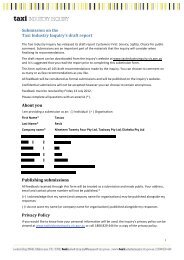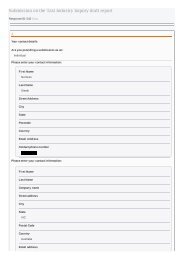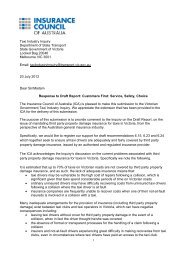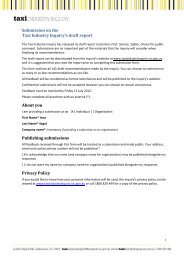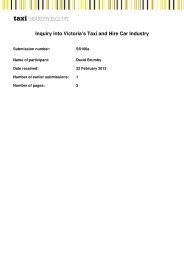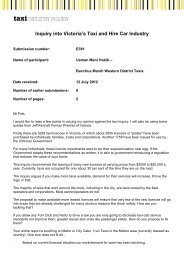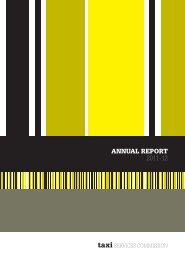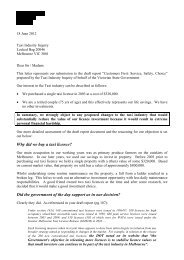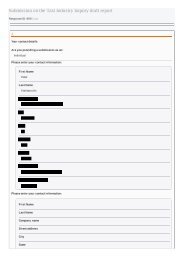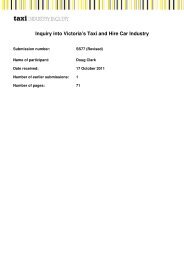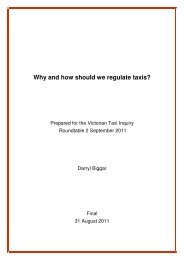Part D â Understanding and improving industry performance (PDF ...
Part D â Understanding and improving industry performance (PDF ...
Part D â Understanding and improving industry performance (PDF ...
You also want an ePaper? Increase the reach of your titles
YUMPU automatically turns print PDFs into web optimized ePapers that Google loves.
The ESC reminded the inquiry of its commentary in the<br />
2007/08 taxi fare review:<br />
This preferred position reinforces Cabcharge’s<br />
dominance in the provision of in-vehicle electronic<br />
payment processing services for the <strong>industry</strong>.<br />
In consequence of this preferential position,<br />
Cabcharge is able to obtain a 10% fee for each<br />
credit card transaction… Options should be<br />
explored for introducing a greater degree of<br />
competition in the provision of taxi-cab credit<br />
card transaction systems. 14<br />
In December 2011, the Cabcharge contract was<br />
extended for two years with a provision allowing<br />
termination of the contract ‘for convenience’ with three<br />
months notice.<br />
The inquiry also notes that the Victorian Government has<br />
not provided an effective opportunity for other <strong>industry</strong><br />
players to compete with Cabcharge. In particular, it has<br />
not defined a set of service requirements <strong>and</strong> equipment<br />
st<strong>and</strong>ards for the MPTP terminal <strong>and</strong> associated<br />
data collection services. Industry participants have<br />
expressed concerns to the inquiry that access to these<br />
specifications is vital for increased competition in the<br />
payment systems market.<br />
State approval of EFTPOS devices<br />
Currently, the Transport (Taxi-Cabs) Regulations 2005<br />
require an EFTPOS terminal to be tailored specifically for<br />
use within the taxi <strong>industry</strong> 15 <strong>and</strong> impose a requirement<br />
for these terminals to be submitted to the licensing<br />
authority for type approval 16 . In assessing an application<br />
for approval, the VTD considers (amongst other things):<br />
• Whether the payment device has been certified by<br />
the Australian Payments Clearing Association<br />
• That only one other payment device is permitted in<br />
the cab (in addition to the MPTP terminal). 17<br />
The device must also generate an electronic receipt that<br />
is fully compliant with the receipt specified in regulation.<br />
The inquiry considers that most of the requirements either<br />
replicate other finance <strong>and</strong> transport <strong>industry</strong> regulations<br />
or are overly prescriptive <strong>and</strong> unnecessary. For example,<br />
regulation should not need to define which device<br />
produces a receipt, only that a receipt must be produced.<br />
No other taxi regulator in Australia requires the approval<br />
of EFTPOS devices. The criteria have effectively<br />
limited the number of EFTPOS providers participating<br />
in the market <strong>and</strong> have supported the need for the<br />
‘intermediary’ payment system between normal EFTPOS<br />
providers <strong>and</strong> taxi operators. As such, the inquiry<br />
considers that the requirements further entrench the<br />
practice of excessive surcharging for electronic payment<br />
of taxi fares.<br />
Commercial barriers<br />
As discussed above, markets for payment instruments<br />
<strong>and</strong> processing are characterised by strong network<br />
effects. Cabcharge has been able to take advantage of<br />
these network effects by tying its br<strong>and</strong>ed cards to its<br />
processing facilities; that is, only Cabcharge EFTPOS<br />
terminals are permitted to process Cabcharge cards.<br />
Cabcharge has not given other payment providers access<br />
to process Cabcharge’s own cards <strong>and</strong> vouchers. As<br />
Cabcharge cards are the most widely used payment<br />
instrument, <strong>and</strong> the only significant taxi-specific payment<br />
instrument, a taxi operator that does not have the ability<br />
to process these cards will be seriously disadvantaged.<br />
This means that alternative processors face a significant<br />
barrier to establishing a market presence. Market inquiries<br />
indicate that Cabcharge br<strong>and</strong>ed charge account cards<br />
<strong>and</strong> eTickets account for up to 40 per cent of non-cash<br />
transactions in the taxi <strong>industry</strong>. 18 This was a key issue that<br />
the Australian Competition <strong>and</strong> Consumer Commission<br />
(ACCC) sought to address in ACCC v Cabcharge Australia<br />
Ltd [2010] FCA 1261 (see case study).<br />
Despite the findings <strong>and</strong> orders of the Federal Court,<br />
third party non-cash payment processing systems are<br />
still unable to accept Cabcharge br<strong>and</strong>ed charge cards,<br />
dockets <strong>and</strong> eTickets. They are limited to the processing<br />
of third party charge cards or bank issued credit cards.<br />
14 ESC, Submission to the Taxi Industry Inquiry, SS151, p.38<br />
15 Regulation 43(7) Transport (Taxi-Cabs) Regulations 2005 requires a<br />
specific form of receipt to be provided<br />
16 Regulation 13A Transport (Taxi-Cabs) Regulations 2005<br />
17 These two criteria are operational policies of the VTD<br />
18 See, for example, Cabcharge Australia Limited, Results Presentation,<br />
Year Ended 31 December 2011, ASX website accessed on 29 March<br />
2012 at: http://member.afraccess.com/media?id=CMN://2A668116&f<br />
ilename=20120223/CAB_01271356.pdf<br />
256



